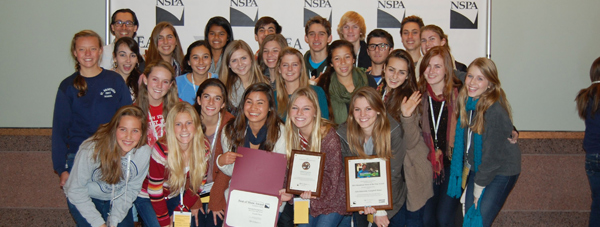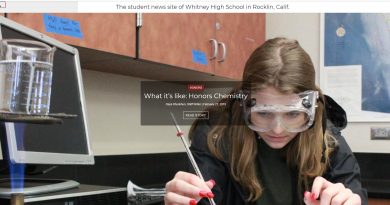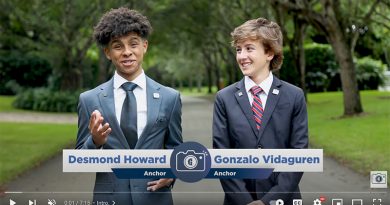Competition Leads to Better News Stories
 One of the most common concerns of broadcast advisers is the fact that their students aren’t motivated to improve their work. Students are content to include crooked shots, under-exposed or blue footage, and shrug it off as “good enough.”
One of the most common concerns of broadcast advisers is the fact that their students aren’t motivated to improve their work. Students are content to include crooked shots, under-exposed or blue footage, and shrug it off as “good enough.”
But being a big fish in a little pond doesn’t do anyone any good. I’ve found that friendly competition can help improve the quality of your show, improve staff unity and morale, and actually help your students with future college or career plans. Here are some tips for using competition to improve your students’ work.
1. Set High Expectations
I always tell my students that our show is–or should be–a nationally award-winning program. When they review footage, or when we critique stories in class, always ask them: “Would this footage/story/show win a national award?” If not, redo it.
2. Don’t do this for your friends or to please the teacher–do this for yourself
Yes, the point of a newscast is to provide information and facts that are useful to your audience. But the actual product should be something that each student can be proud to put on a demo reel when they apply to film or journalism school, or apply for a job. Ask them: “Is this as good as–or better than–another applicant would submit for their application?” If not, keep working on it.
3. How do we compare to other schools?
What’s the competition doing, and how are they able to win awards when we aren’t? Think about topic and angle of the story, and how it’s new or fresh in some way. Analyze the footage, shot by shot. Listen to how sound is used and mixed, etc. Make comparisons to work recently completed by your own staff to see what the differences are. This could be discouraging for some students, so try to keep it positive.
A great resource is to view the Broadcast Pacemakers and Broadcast Story of the Year finalists and winners on the NSPA website.
4. Enter your work to competitions
You can’t win if you don’t submit. And even if you don’t win, it will clarify for your students how they’re doing and what they might need to improve upon. Many competitions also provide feedback from the judges. Some competitions include the NSPA Story of the Year and Broadcast Pacemakers, and the JEA Write-Off competitions. There are also many local and regional competitions for broadcast journalism.
5. What are the pros doing right?
Some of your students will want to pursue broadcast journalism as a career, so they should see what the pros are doing and learn from the best. The same principle applies to writers, artists, and athletes, so why not journalists?
Some great examples of videography and editing are made available by National Press Photographers Association, which hosts the winners of annual competitions.
Keep in mind that you want to make this a friendly competition. Never pit individual students against each other–instead, make the goal for your entire staff to win awards that other newscasts have won. Recognize your students for improving and innovating, which can be in the form of how you grade them, or just a shout out to them in class. Either way, this competition will help light a fire under their feet and keep your students moving in the right direction.






Pingback:Broadcast Journalism Competitions | jeadigitalmedia.org